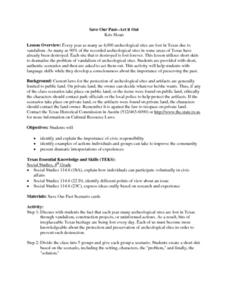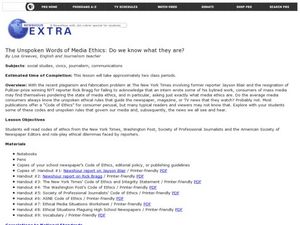Curated OER
Earth: The Source of Resources
Students study responsible stewardship and natural resources. In this natural resources lesson, students share their motto's about the environment with the class. Students then discuss the regulations in 'Rules and Regulations for...
Curated OER
Academic Raceway 500
In this community government PowerPoint, students participate in a game with a race track format in which they answer questions about local government, the election process, and the decision making process used in a democracy.
Curated OER
Philanthropy in Literature
Students define the term philanthropy and find examples of it in everyday life. In this philanthropy lesson, students try to define philanthropy and illustrate it. Students then work in groups to define the term and create a web for the...
Curated OER
Teams-Games-Tournaments
Students review civics standards by playing a game. Each person has a specific role that they are responsible for. They answer questions on topics of leaders, authority, officials, and others.
Curated OER
Martin Luther King, Jr.
Fifth graders discuss the importance of Martin Luther King, Jr. and reflect on civic responsibilities. They brainstorm ways in which they can help to fulfill Martin Luther King, Jr.'s dream of equality among all people. Students write...
Curated OER
Evolution of the Right to Vote in Canada and Around the World
Students explore civics and develop their research skills while learning about democracy.
Curated OER
We Need Cash
Students describe charitable, religious, and civic services in their community, and argue for the value of these services. They write a one-page explanation as to why this service is important to the community and why it deserves $5,000.
Curated OER
The Missouri Headwaters: A Confluence of Cultures
Fourth graders research and analyze how people create and change structures of power, authority and government diversity. They review their civic responsibilities. In addition, they identity the major responsibilities of local, state,...
Curated OER
Save Our Past -- Act It Out
Fourth graders identify and examine the importance of civic responsibility and the result of losing many archeological sites in Texas. In groups, they are given scenerio cards and act out each scene for the class. They also write a...
Curated OER
Building a "Toolbox for Difference"
Students discover how race and gender relate to their sense of civic obligation. As a class, they create a 3-D toolbox for making a difference in their community or the world. They write an essay to accompany it explaining the design and...
Curated OER
The Unspoken Words of Media Ethics: Do we know what they are?
Students read codes of ethics from the New York Times, Washington Post, Society of Professional Journalists and the American Society of Newspaper Editors. In this Civics lesson, 10th graders role-play ethical dilemmas faced by...
Center for Civic Education
Historical Analysis of Constitutional Amendments
Each of the 27 Amendments to the U.S. Constitution were adopted within specific economic, political, social or cultural, and international contexts. As part of their Constitution Day/Week studies, seniors investigate these factors for...
Annenberg Foundation
Controversial Issues in Practice
Wow! This resource provides three related lessons on the First Amendment that challenge US government young scholars to explore their personal opinion on the separation of church and state. Each lesson can be adjusted in length, but is...
State Bar of Texas
McCullough v. Maryland
Can a state government tax the federal government? The Supreme Court case McCullough v. Maryland explores different governments in the United States. Scholars research the court's decision with a video and discussion. They formulate...
State Bar of Texas
Plessy v. Ferguson
Where did separate but equal originate and what does it mean? Scholars investigate the Supreme Court Case Plessy v. Ferguson. Using a short video clip, they analyze the impact the decision of legal segregation had on society in 1896....
State Bar of Texas
Schenck v. US
Freedom of speech is absolute—or is it? The Supreme Court case Schenck v. United States has learners research what free speech really looks like. A short video along with paired work creates open discussion and thought on what speech is...
State Bar of Texas
Sweatt v. Painter
Is separate but equal actually equal? The 1950 Supreme Court case Sweatt v. Painter discusses the law of segregation and inequality. Scholars investigate the impact of the case on the desegregation of public schools across the nation...
State Bar of Texas
Hernandez v. Texas
What if the jury is not made up of people from your ethnicity or background—are they still considered your peers? Scholars analyze the impact the Supreme Court case Hernandez v. Texas had on jury selection across the nation. Paired...
State Bar of Texas
Baker v. Carr
Can the federal government override the state government to protect the citizens of the United States? The 1962 Supreme Court case Baker v. Carr outlines the issue of equal protection under the law. Scholars investigate with a short...
State Bar of Texas
Engel v. Vitale
Can you bow your head and pray in school? Scholars investigate the issue of school prayer with the Supreme Court case Engel v. Vitale. A short video clip along with paired group work helps viewers form opinions on the matter. They answer...
State Bar of Texas
Miranda v. Arizona
You have the right to remain silent—but why? Scholars analyze the nature of what has become known as the Miranda Rights. A short video along with paired group work and discussion opens the issue of the rights of the accused upon arrest....
State Bar of Texas
Wisconsin v. Yoder
How far does freedom of religion truly go? The 1972 Supreme Court case Wisconsin v. Yoder introduces the concept of the free exercise clause of the First Amendment. Individuals examine the case with a short video and open discussion. To...
State Bar of Texas
Roe v. Wade
At what point does the right of privacy end and the government begin? Scholars research rights under the Ninth Amendment to the Constitution. Using the 1973 Roe v. Wade Supreme Court case as a starting point, along with small group work...
State Bar of Texas
White v. Regester
One vote doesn't really matter, right? Class members investigate the concept of voter rights and restrictions using the 1973 Supreme Court case White v. Regester. They view a short video and work in pairs to analyze how people create...
Other popular searches
- Civics and Economics
- Introduction to Civics
- Social Studies Civics
- Civics Political Cartoons
- Civics Project
- Civics Lesson Plans
- American Civics
- Civics Business
- Civics Civil War
- Civics Citizen
- U.s. American Civics
- Civics 2008 Election























